Oroqen people in north China witness astonishing changes in their life
Xinhua
1628730736000
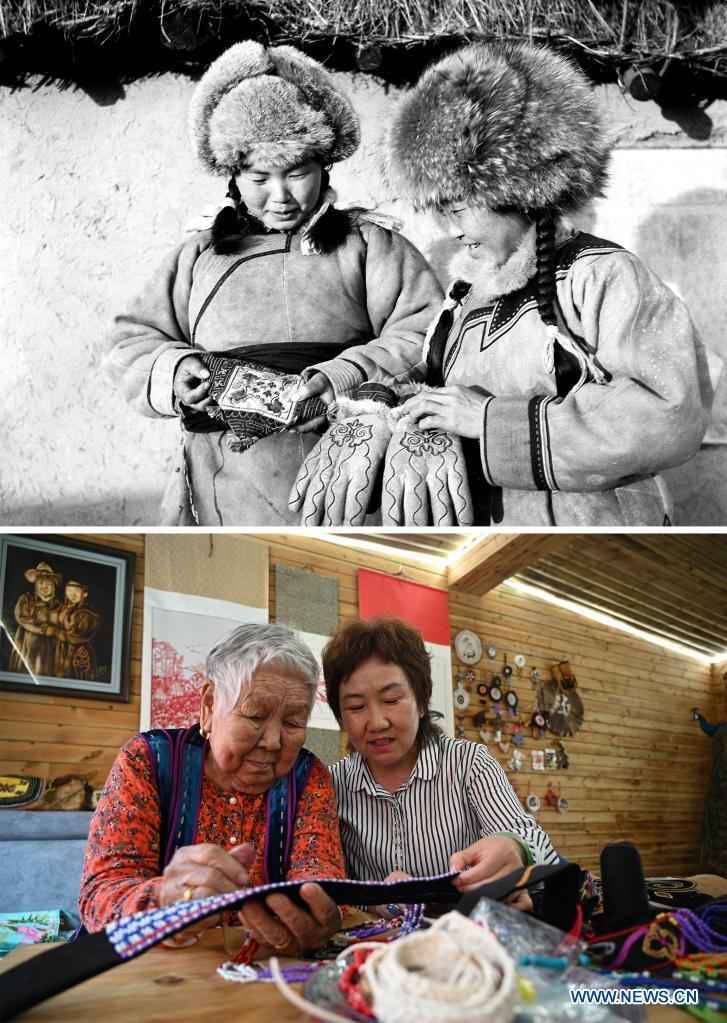
In this combo photo, the upper part taken in 1961 shows two Oroqen women making handicrafts; and the lower part taken by Lian Zhen on Aug. 5, 2021 shows Oroqen woman Ge Shumei and her daughter-in-law A Liyan checking a handmade head decoration in Ali River Township of Oroqen Autonomous Banner, north China's Inner Mongolia Autonomous Region. Oroqen, dubbed "China's last hunting ethnic minority," is one of the smallest ethnic groups in China. They used to live a nomadic life, hunting in the forests. After the establishment of the Oroqen Autonomous Banner in 1951, the lives of the Oroqen people changed for the better. By 1958, many of the region's nomads had settled down and changed the way they lived and worked. The Oroqen people made a tremendous leap from primitive tribes to modern civilization. The past seven decades have witnessed astonishing changes in their life. (Xinhua)
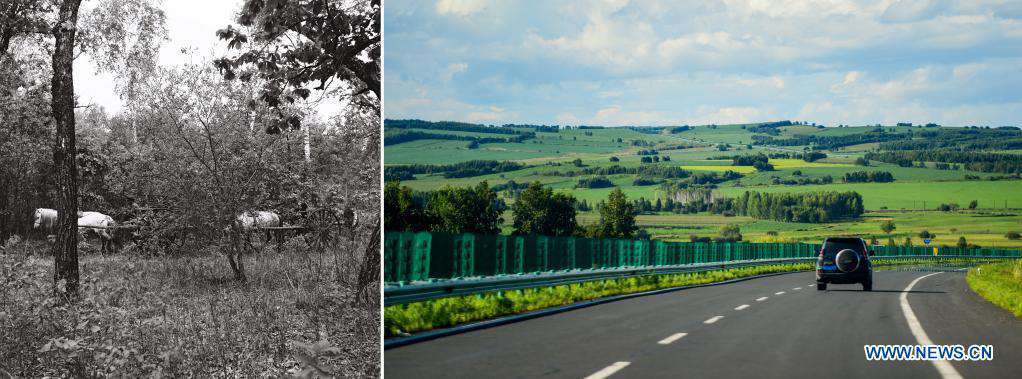
In this combo photo, the left part provided by the authority of Oroqen Autonomous Banner, north China's Inner Mongolia Autonomous Region, shows a horse-drawn carriage moving through the forest in 1954; and the right part taken by Lian Zhen on Aug. 6, 2021 shows a motor vehicle running on a highway in Oroqen Autonomous Banner. Oroqen, dubbed "China's last hunting ethnic minority," is one of the smallest ethnic groups in China. They used to live a nomadic life, hunting in the forests. After the establishment of the Oroqen Autonomous Banner in 1951, the lives of the Oroqen people changed for the better. By 1958, many of the region's nomads had settled down and changed the way they lived and worked. The Oroqen people made a tremendous leap from primitive tribes to modern civilization. The past seven decades have witnessed astonishing changes in their life. (Xinhua)
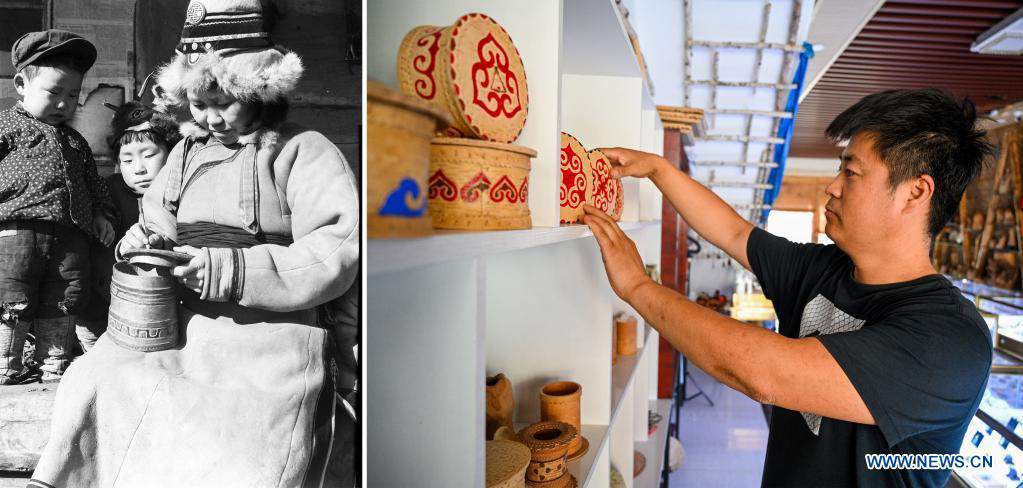
In this combo photo, the left part taken in 1961 shows an Oroqen woman drawing on a box made of birch bark; and the right part taken by Lian Zhen on Aug. 7, 2021 shows Jiang Lixian arranging decorated birch-bark boxes at his handicrafts shop in Ali River Township of Oroqen Autonomous Banner, north China's Inner Mongolia Autonomous Region. Oroqen, dubbed "China's last hunting ethnic minority," is one of the smallest ethnic groups in China. They used to live a nomadic life, hunting in the forests. After the establishment of the Oroqen Autonomous Banner in 1951, the lives of the Oroqen people changed for the better. By 1958, many of the region's nomads had settled down and changed the way they lived and worked. The Oroqen people made a tremendous leap from primitive tribes to modern civilization. The past seven decades have witnessed astonishing changes in their life. (Xinhua)

In this combo photo, the left part taken by Bai Hao in the 1970s shows a street of Ali River Township of Oroqen Autonomous Banner, north China's Inner Mongolia Autonomous Region; and the right part taken by Lian Zhen on Aug. 5, 2021 shows a general view of the same township. Oroqen, dubbed "China's last hunting ethnic minority," is one of the smallest ethnic groups in China. They used to live a nomadic life, hunting in the forests. After the establishment of the Oroqen Autonomous Banner in 1951, the lives of the Oroqen people changed for the better. By 1958, many of the region's nomads had settled down and changed the way they lived and worked. The Oroqen people made a tremendous leap from primitive tribes to modern civilization. The past seven decades have witnessed astonishing changes in their life. (Xinhua)
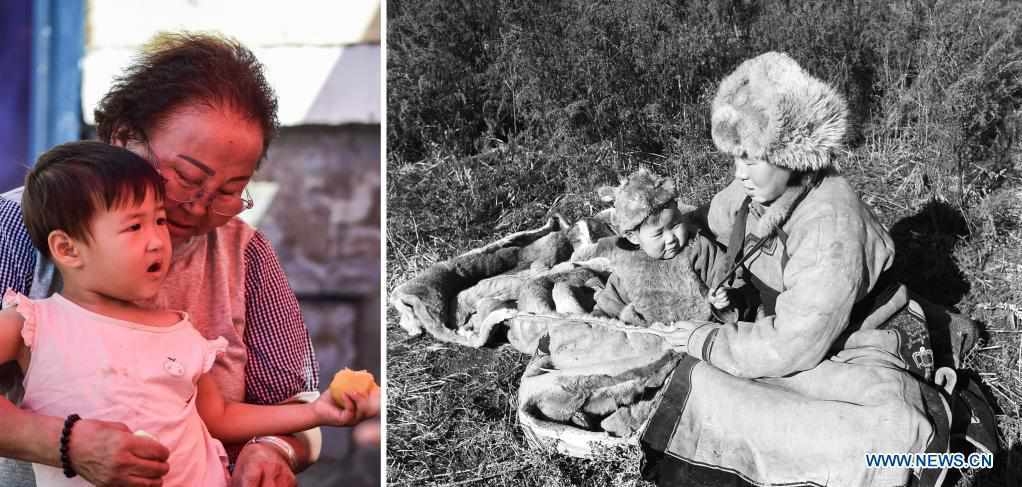
In this combo photo, the right part taken in 1953 shows an Oroqen woman and her daughter during a hunting trip; and the left part taken by Lian Zhen on Aug. 6, 2021 shows Oroqen woman He Pinghua taking care of her granddaughter at her residence in Duobukur Village for hunting people in Dayangshu Township of Oroqen Autonomous Banner, north China's Inner Mongolia Autonomous Region. Oroqen, dubbed "China's last hunting ethnic minority," is one of the smallest ethnic groups in China. They used to live a nomadic life, hunting in the forests. After the establishment of the Oroqen Autonomous Banner in 1951, the lives of the Oroqen people changed for the better. By 1958, many of the region's nomads had settled down and changed the way they lived and worked. The Oroqen people made a tremendous leap from primitive tribes to modern civilization. The past seven decades have witnessed astonishing changes in their life. (Xinhua)
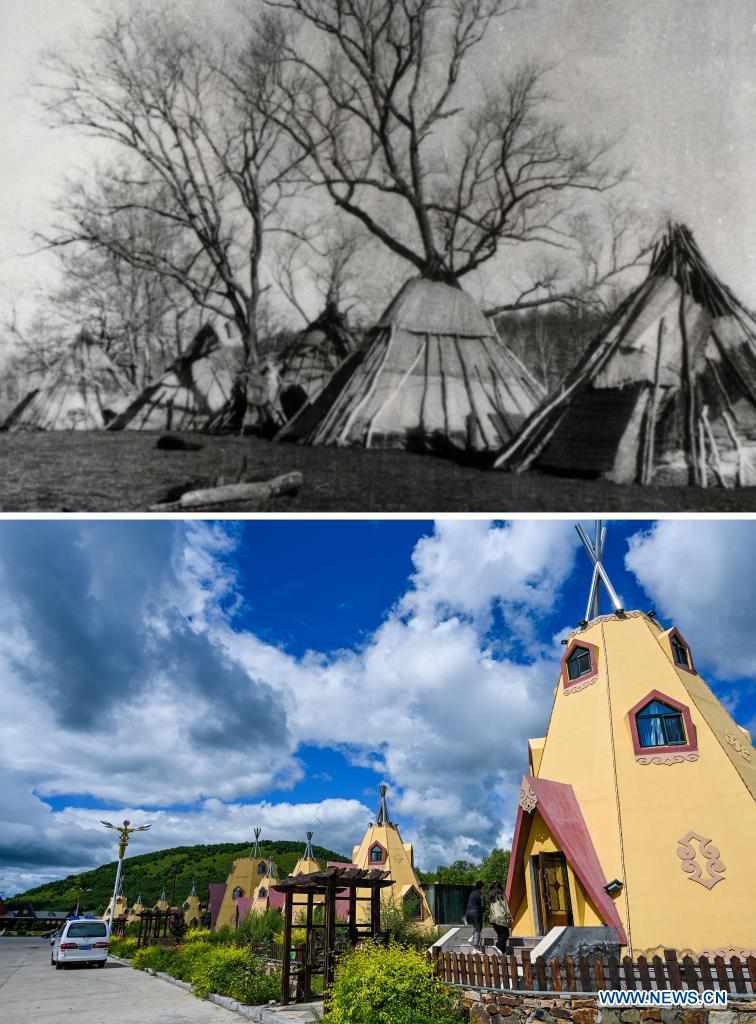
In this combo photo, the upper part provided by the authority of Oroqen Autonomous Banner, north China's Inner Mongolia Autonomous Region, shows residences of Oroqen people during their nomadic days; and the lower part taken by Lian Zhen on Aug. 6, 2021 shows a specialty scenic spot in Duobukur Village for hunting people in Dayangshu Township of the banner. Oroqen, dubbed "China's last hunting ethnic minority," is one of the smallest ethnic groups in China. They used to live a nomadic life, hunting in the forests. After the establishment of the Oroqen Autonomous Banner in 1951, the lives of the Oroqen people changed for the better. By 1958, many of the region's nomads had settled down and changed the way they lived and worked. The Oroqen people made a tremendous leap from primitive tribes to modern civilization. The past seven decades have witnessed astonishing changes in their life. (Xinhua)
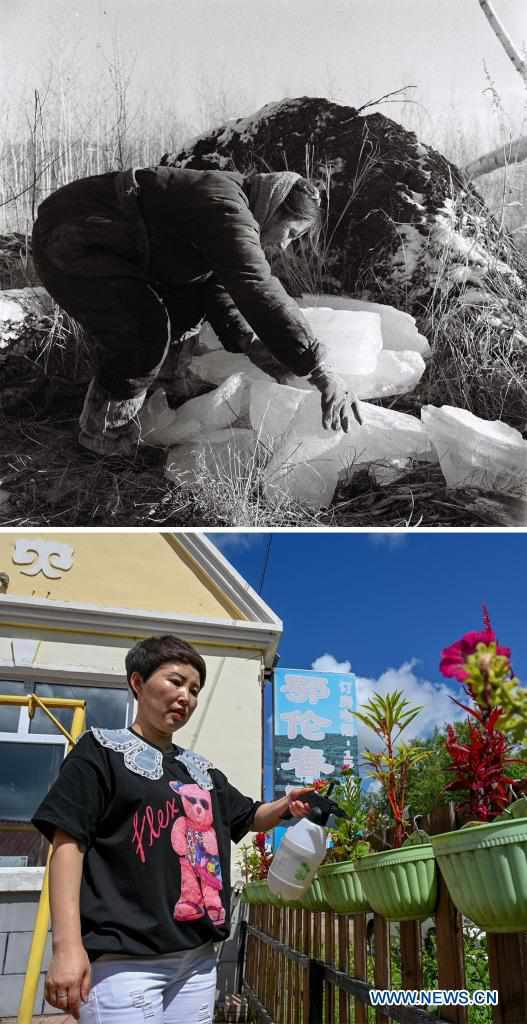
In this combo photo, the upper part taken in 1953 shows an Oroqen woman fetching ice blocks from a river for water; and the lower part taken by Lian Zhen on Aug. 6, 2021 shows villager Guan Li watering flowers at her homestay in Duobukur Village for hunting people in Dayangshu Township of Oroqen Autonomous Banner, north China's Inner Mongolia Autonomous Region. Oroqen, dubbed "China's last hunting ethnic minority," is one of the smallest ethnic groups in China. They used to live a nomadic life, hunting in the forests. After the establishment of the Oroqen Autonomous Banner in 1951, the lives of the Oroqen people changed for the better. By 1958, many of the region's nomads had settled down and changed the way they lived and worked. The Oroqen people made a tremendous leap from primitive tribes to modern civilization. The past seven decades have witnessed astonishing changes in their life. (Xinhua)


